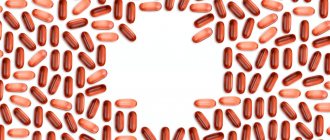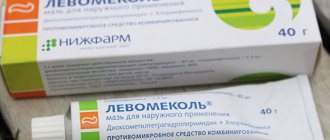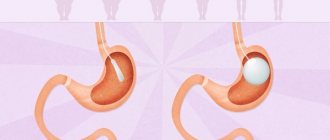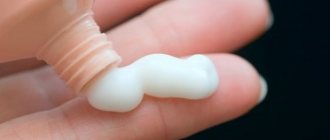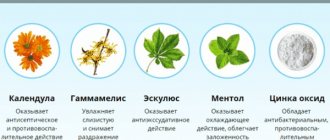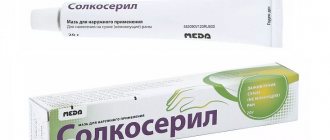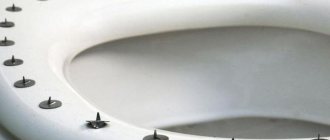Heparin ointment is a direct anticoagulant. It is intended for external use. The drug is a white or slightly yellowish homogeneous mass. Heparin ointment is made on the basis of petroleum jelly, which ensures ease of application. The stability of the composition is maintained by glycerin.
The combined drug contains three main components:
- Heparin sodium. This substance is an anticoagulant. It promotes the resorption of hematomas, relieves swelling and reduces inflammatory processes.
- Benzocaine, which provides the drug with analgesic properties.
- Benzyl nicotinate. This substance accelerates the penetration of heparin through the skin.
The long shelf life of the drug and the preservation of medicinal properties are ensured by the presence of a preservative in the composition - nipagin. The anti-inflammatory effect of the ointment is enhanced by another additional component - peach oil.
The ointment is packaged in compact aluminum tubes of 10, 20, 25, 30 or 50 g. This allows you to select the amount of product according to the situation. The tube is packaged in a cardboard box along with instructions for use of the medicinal product.
Pharmacodynamics and pharmacokinetics
Pharmacodynamics
When applied to the skin, the ointment prevents the formation of blood clots and has an anti-inflammatory and local anesthetic effect.
Heparin , which is gradually released from the ointment, reduces the inflammatory process and has an antithrombotic effect ; benzyl nicotinate (benzyl ester of nicotinic acid) dilates superficial vessels, thereby promoting the absorption of heparin ; Benzocaine relieves pain.
Pharmacokinetics
Heparin from the skin surface in small quantities. Up to 95% of the substance is in a state bound to plasma proteins, the volume of distribution (Vd) is 0.06 l/kg.
It does not penetrate the placental barrier or into breast milk.
Metabolized in the liver. T1/2 of heparin - on average, 1.5 hours. The substance is excreted by the kidneys.
Local application of Heparin ointment does not lead to changes in blood .
Benzyl nicotinate penetrates all layers of the skin, but practically does not enter the systemic circulation. Benzocaine is almost not absorbed when applied externally.
Composition and active substances
| Substances that affect human blood clotting are often used in medicine to prevent the formation of blood clots and/or resorption of already formed blood clots during surgery, in patients after myocardial infarction and in the treatment of other diseases of the cardiovascular system. |
Anticoagulants, the so-called substances that affect the coagulation of human blood, suppress the formation of fibrin, the main protein in blood clots, and also inhibit the growth of existing clots.
All anticoagulants are divided into a number of groups, according to the method and speed of action:
- direct anticoagulants (substances that act directly on the formation of thrombin),
- indirect anticoagulants (substances that reduce the rate of formation of elements responsible for the process of blood clotting).
Heparin is a direct anticoagulant with antithrombotic and anti-inflammatory effects. It was first isolated from the liver, hence the name heparin - from the ancient Greek ἧπαρ - liver. Heparin has a direct effect on blood plasma, involving compounds that enhance the anticoagulant effect.
It is used in the prevention and treatment of thrombosis, thrombophlebitis, thromboembolism and thromboembolic complications.
- Thrombosis is a pathological condition in which blood clots form inside blood vessels, blocking the free flow of blood.
- Thrombophlebitis is the formation of a large blood clot that blocks the lumen of a vein.
- Thromboembolism is a blockage of a vessel by a large blood clot that breaks away from the site of its formation and enters the bloodstream.
Heparin ointment is a combined-spectrum drug intended for external use. The ointment contains:
- heparin,
- benzocaine,
- benzyl nicotinate.
We talked about heparin above. Regarding benzocaine , it is a local anesthetic that reduces pain. Benzyl nicotinate is a substance that dilates superficial blood vessels, which facilitates the rapid absorption of heparin into the blood. In turn, heparin, having separated from the additional components of the ointment, has an antithrombotic effect and reduces the inflammatory process.
Side effects
With prolonged use, local reactions may develop in the form of decreased sensitivity in the treated area, skin hyperemia, hypersensitivity reactions ( skin rash , itching ).
When using topical forms of heparin , the risk of developing type II HIT (with a sharp drop in platelet (Tr) to <50% of the initial value, a decrease in the number of Thr <100,000 × 109/l, with venous/arterial thrombosis or embolism) cannot be excluded.
For this reason, when using the drug, the level of Tr in the blood should be additionally monitored in patients with a history of thromboembolism
In patients without pre-existing hypersensitivity to heparin, with parenteral administration of heparin , a decrease in Tp levels is usually observed 6-14 days after the start of treatment. In case of hypersensitivity to heparin, HIT may develop within a few hours.
Briefly about what hemorrhoids are
Hemorrhoids are a type of varicose veins in the rectum. Most often, this disease develops quite quickly, so people discover this problem at more serious stages. However, after some time, symptoms of hemorrhoids appear, such as pain, itching in the anus, bloody discharge from the rectum when going to the toilet, and even prolapse of hemorrhoids.
Hemorrhoids are a type of varicose veins in the rectum
All this prevents you from actively moving and just living a normal, everyday life. The danger of hemorrhoids should not be underestimated, because it can cause problems such as fistulas and suppuration in the anus. And only timely correct treatment under the supervision of a doctor can save the patient from this disease.
Heparin ointment, instructions for use (Method and dosage)
Instructions for use of Heparin ointment for phlebitis and thrombophlebitis
For post-infusion/post-injection phlebitis , as well as for the treatment of thrombophlebitis of the superficial veins, the ointment 2-3 times a day is applied in a thin layer to the affected area and gently rubbed into the skin. To treat an area with a diameter of 3-5 cm, 0.5-1 g of the drug is enough. Treatment usually lasts from 3 to 7 days.
Heparin ointment for hemorrhoids
In case of exacerbation of chronic hemorrhoids, the ointment is applied directly to the inflamed hemorrhoids on a linen or calico pad, which is then fixed with a bandage.
Reviews indicate that another way of using the drug is no less effective - in the form of tampons: the tampon is soaked in ointment and then inserted into the anus.
to use Heparin ointment for hemorrhoids daily 2 or 3 times a day until the inflammation disappears. Treatment lasts no more than 10 days.
Hemorrhoids are a fairly common occurrence during pregnancy , but it should be remembered that pregnant women are allowed to use any medications only with the approval of a doctor.
Heparin ointment for varicose veins
For varicose veins , the drug is especially effective in the early stages of the disease, when spider veins and dilated veins are just beginning to appear: the product reduces pain, relieves the feeling of heaviness, redness, itching and swelling, accelerates the resorption of already formed blood clots and prevents the formation of new ones, and normalizes microcirculation.
The medicine should be applied to the area of altered blood vessels daily 3 times a day for 2 weeks.
Contraindications for use in varicose veins ( varicose veins ) are the presence of open ulcers or any other damage to the skin, as well as known intolerance to any drug from the group of local anesthetics.
Heparin ointment for bruises
Heparin is considered one of the most effective remedies for bruises. Having an anticoagulant effect , it accelerates the resorption of blood clots formed under the skin and improves the condition of capillaries.
The benzyl ester of nicotinic acid contained in Heparin ointment has a vasodilating effect, thereby improving the absorption of heparin . The local anesthetic benzocaine helps relieve pain.
Method of using ointment for bruises: the course of treatment heparin -containing agents ranges from 5 to 15 days. The ointment is applied to the site of the injury/bruise 2-3 times a day and gently rubbed into the skin.
Almost all the reviews that can be read on forums about Heparin ointment are positive: the product copes with subcutaneous hematomas in 2-4 days.
Why is Heparin ointment used in cosmetology?
Many pharmaceutical products are quite successfully used to eliminate certain cosmetic defects. Since the main indications for the use of Heparin ointment are VVR, hemorrhoids , mastitis , bruises, the question naturally arises, why can the drug be used in cosmetology?
For the face, ointment is used as a remedy:
- from wrinkles;
- for acne;
- from bags under the eyes.
One of the signs that a person has impaired blood flow is swelling . And they are especially noticeable under the eyes, since the skin in this place is very thin and delicate. Swelling is often accompanied by darkening of the skin.
To get rid of this problem, you should apply Heparin ointment under the eyes once a day: with your fingertips, lightly patting the skin, and not too close to the mucous membrane.
Important! For the face, the drug is used only after testing for allergies to it. To check the tolerability of the product, apply it to the inside of the wrist or elbow and observe the reaction.
The ointment relieves inflammation well and reduces pain in the affected area. Due to these properties, it is sometimes used as a remedy for acne. For this purpose, the drug is applied to the face in a thin layer 3 times a day until the inflammation completely goes away.
In the same way, the drug is used to treat rosacea .
As a remedy for wrinkles, Heparin ointment is used 2 times a day. Apply it with light massage movements without stretching the skin (especially around the eyes). The anti-aging properties of heparin are most likely due to its absorbent and anti-edematous properties.
Reviews about the use of the facial product allow us to conclude that it is impossible to radically solve the problem of wrinkles that have already appeared with the help of the drug. However, it is able to prevent the emergence of new ones and stop the development of existing ones.
Symptoms of hemorrhoids and heparin ointment
The cost of heparin ointment is relatively small
As a rule, no person turns to a specialist immediately after the very first symptoms of hemorrhoids appear. And that is why the disease gets so advanced that it has to be treated with stronger medications. Heparin ointment, although one of the best medications for the treatment of hemorrhoids, is not able to provide significant assistance in the very last stages. Therefore, it is recommended to use it either in complex treatment, or immediately after the appearance of symptoms such as:
- Itching and burning in the anus. Most often, such symptoms warn of skin stretching, which cannot happen just like that.
- The appearance of pain, especially during bowel movements
- A feeling of heaviness that appears immediately after the swelling of hemorrhoids
If, when the above symptoms appear, you immediately apply heparin ointment to the sore spot, then it is quite possible that after a short period of time they will disappear, and the disease will no longer make itself felt. The therapeutic effect after using the ointment is felt after a short period of time, pain is significantly reduced, and swelling subsides. This is due to the fact that the main components of the drug promote the outflow of blood from hemorrhoids. And therefore, the cones decrease in size, and accordingly, all symptoms disappear. True, the effect of the ointment does not last long, about eight hours (it all depends on the individual characteristics of the body).
It is advisable to use heparin ointment for external hemorrhoids, when the nodes become more or less visible. In the case of internal hemorrhoids, it is difficult to achieve a positive effect, since the inflamed hemorrhoids are located deep inside the colon, and it is very difficult to influence them with ointments for external use.
Interaction
The anticoagulant effect of heparin is enhanced by the simultaneous use of the drug with antiplatelet agents , anticoagulants and NSAIDs.
The use of the drug with thyrotoxin , ergot alkaloids , antihistamines , tetracycline and nicotine reduce the effect of heparin .
Heparin should not be administered topically in combination with NSAIDs, H1-histamine receptor blockers, or tetracyclines.
special instructions
If long-term treatment is necessary, as well as in the case of using the drug to treat large areas of the body and simultaneous ingestion of drugs that affect hematopoiesis and/or coagulation system, it is necessary to monitor PTI and clotting time.
Similar monitoring is required if long-term use is necessary and for large areas of damage in women over 65 years of age and in pregnant women.
The drug is not intended for treating open wounds. Also, you should not apply it to the skin in the presence of purulent processes.
Not recommended for use in cases of DVT ( deep vein thrombosis ).
Due to the possibility of systemic action of heparin, patients with a history of thromboembolic complications
Methyl and propyl parahydroxybenzoate may cause delayed hypersensitivity reactions.
Does not adversely affect the ability to operate machinery and drive vehicles.
External hemorrhoids: treatment, medications and indications for use
External hemorrhoids are one of the types of varicose veins with pathological disorders of the venous vessels of the anus and lower rectum. It is localized around the anus and always causes frequent pain during bowel movements, which can only be relieved with painkillers, discomfort in the anus, burning and itching. External nodes are easily palpable. The number of “bumps”, their size and location depends on the individual characteristics of the organism.
The main danger of external hemorrhoids is the possibility of thrombosis. Inflamed veins not only cause maximum discomfort, but can also be easily injured, resulting in bleeding. Due to the high pressure in the venous vessels, it is quite difficult to stop it. Medicine to relieve local symptoms is selected based on the severity of the disease.
Causes of external hemorrhoids
External hemorrhoids have their own symptoms that are different from the internal form of the disease. However, only an experienced specialist, after a thorough diagnosis, will be able to make the correct diagnosis and prescribe the necessary medications. The difficulty is that with internal localization, the “bumps” fall out, and with external localization, they directly form in the subcutaneous tissues around the anus.
External varicose veins of the anus are the result of prolonged stagnation of blood, which leads to dilation and modification of the veins. Provoking factors can be a hereditary predisposition, which causes tissue degeneration of the venous vessels, as well as a whole list of reasons depending on the patient:
- Inactive lifestyle, minimal physical activity;
- Long-term work in a “sitting” position;
- Obesity;
- Abuse of fatty and spicy foods, alcohol;
- Failure to maintain water balance;
- Hormonal disbalance;
- Pregnancy and childbirth.
In practice, there is no single objective reason for the development of external hemorrhoids. Therefore, treatment methods and the choice of medication will depend on the root cause and additional factors in order to eliminate not only the symptoms, but also influence the overall condition of the blood vessels. Particular attention should be paid to the treatment of external hemorrhoids in pregnant women. The reason for its appearance in this situation is excessive compression of the greater vena cava as a result of the growth of the fetus in the uterus. Not all prescribed medications are suitable for the expectant mother, so the choice of drugs must be approached very carefully.
Conservative methods of treating external hemorrhoids
External hemorrhoidal syndrome can be treated with surgery, minimally invasive operations and conservative methods, which involve taking medications, using topical medications and physiotherapeutic procedures.
Conservative medicine is one of the main components of complex therapy for hemorrhoids. Tablets and ointments are most effective in the first stages of the disease or in the prevention of varicose veins. At later stages of development, drugs are used as an additional means of therapy to relieve severe symptoms and pain. As part of conservative treatment, the following procedures may be prescribed:
- Local medications - rectal suppositories, ointments, gels with anti-inflammatory, decongestant and analgesic effects;
- Medicinal baths and enemas with a calming and antibacterial effect;
- Regular anal hygiene, which includes using wet wipes, showering after each bowel movement, wearing comfortable cotton underwear;
- Venotonic drugs - this group of drugs includes popular phlebotonics, angioprotectors and blood thinners.
Analogs
Level 4 ATC code matches:
Girudoproct
Heparoid Zentiva
Heparin
Gepatrombin G
Lyoton
Trombless
Venolife
Hepatrombin
Analogs of Heparin ointment with a similar mechanism of action: Venolife , Venitan Forte , Hepatrombin , Geparoid Zentiva , Trombless , Contractubex , Lyoton 1000 , Venabos , Heparin , Venabos , Trombless Plus .
Which is better: Lyoton or Heparin ointment?
The drug Lyoton 1000 , like its analogue, contains sodium heparin as an active substance, but in a much higher concentration - 1000 IU/g.
Lyoton is produced in the form of a gel, therefore, it penetrates the skin better and faster than products produced in the form of an ointment.
Another difference between the drugs is that Heparin ointment, in addition to heparin, also contains components that enhance its effect - benzyl nicotinate and benzocaine .
Which is better: Troxevasin or Heparin ointment?
Troxevasin is a capillary stabilizing agent. Its active substance is a mixture of bioflavonoids , which contains at least 95% troxerutin ( troxerutin in 1 gram of ointment is 20 mg).
The action of the drug is aimed at reducing swelling, pain, improving trophism and eliminating various kinds of pathological disorders caused by venous insufficiency.
Both drugs are good, but their effects are somewhat different. Troxerutin has venotonic, angioprotective, anti-edematous and anti-inflammatory effects. Heparin is a local anesthetic and anticoagulant.
It is believed that Troxevasin is more effective when it is necessary to relieve swelling, and its analogue is more effective when it is necessary to accelerate the resorption of the hematoma.
Reviews of Heparin ointment
Heparin ointment is an inexpensive and very effective remedy. It is used for hemorrhoids , bruises , and varicose veins . You can also find good reviews about Heparin ointment for the face: in cosmetology, the drug is most often used to eliminate bruises and bags under the eyes.
Reviews about Heparin Ointment for Wrinkles are more controversial: some say that the drug is very effective in the fight to preserve youthful skin, while others claim that they have not noticed any serious improvements.
But reviews of Heparin ointment for hemorrhoids are extremely positive - the drug works great when it comes to such a delicate problem, and if indicated, it can be used even during pregnancy.
varicose veins has proven itself no less well : patients say that spider veins on the legs noticeably decrease (and sometimes completely disappear) after just 1-2 weeks of regular use.
Heparin ointment for hemorrhoids
Hemorrhoids are a serious disease, acute forms of which can lead to the need for surgical intervention and significantly delay the recovery process. Heparin ointment has proven itself to be an effective remedy in the treatment of this disease. When treating hemorrhoids with ointment, you can relieve the symptoms of tension, pain, and a feeling of constant discomfort. Its use, as well as the use of other drugs with heparin, is indicated to provide a local thrombolytic effect, as well as to reduce inflammation.
As mentioned at the beginning of the article, the main effect of heparin is to reduce the production of fibrin in human blood, which is the basis for the formation of blood clots. By acting on fibrin directly in the bloodstream, heparin effectively combats the high risk of blood clots, which reduces the likelihood of vein blockage and the subsequent occurrence of an inflammatory process. The benzonicotinate and benzocaine contained in the ointment promote rapid absorption of the active substance and relieve pain. The ointment is indicated not only for hemorrhoids, but also when it is complicated by thrombosis of hemorrhoidal veins.
When prescribing an ointment, you should pay attention to contraindications and side effects. So the drug should not be used if the patient has hypersensitivity to the components of the drug, with necrosis and bleeding disorders. For pregnant women and during lactation, Heparin ointment can be used only as prescribed by a doctor. During treatment, you should be attentive to possible side effects, as allergic skin reactions, rashes and swelling may occur. If they occur, you should stop treatment and consult a doctor to find a possible alternative.
There are two ways to use ointment for hemorrhoids. If hemorrhoids are localized externally, then the ointment is applied to a gauze flap or pad and applied to the site of the problem, after which it is fixed. If the disease is hidden, then a tampon is soaked in the ointment and inserted into the anus. Treatment of hemorrhoids with Heparin ointment can take from three to fourteen days, depending on the complexity of the disease.
It is also worth remembering that the drug is not a panacea and if there is no improvement in the patient’s condition, it is necessary to consult a proctologist to prescribe an alternative treatment.
How much does Heparin ointment cost?
The price of Heparin ointment in Russia is from 63 to 92 rubles: you can buy a manufactured drug for 64 rubles, and the cost of an ointment for external use produced by is 85 rubles.
The price of Heparin ointment in Ukraine is from 46 to 60 UAH. At the same time, the price in Kharkov is practically no different from the price in Kyiv or, for example, Odessa pharmacies.
- Online pharmacies in RussiaRussia
- Online pharmacies in UkraineUkraine
ZdravCity
- Heparin ointment 25g RUP Belmedpreparaty
69 rub. order - Heparin ointment 25 gAO "Nizhpharm"
99 RUR order
- Heparin ointment 25gGreen Dubrava JSC
65 rub. order
Pharmacy Dialogue
- Heparin ointment (tube 25g) Nizhpharm JSC
93 RUR order
show more
Pharmacy24
- Heparin ointment 25 g TOV DKP Pharm.Fabrika, Ukraine
46 UAH order


